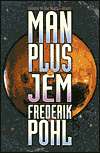|
|
JemFrom Richard D. Erlich, Introduction to the Easton Press edition:
Jem is a novel dealing with three of the great themes of SF: first contact with intelligent alien species, planetary disaster, and future politics - the political ideal of utopia for one thing, but also the Machiavellian politics of power-blocs, balance of power, "brinkmanship," and imperialism. Jem is a masterwork of science fiction writing because it presents these themes through well-drawn characters acting in a beautifully-structured story told with tact, economy, and insight, a story richly varied in tone and incident, and rigorously honest. Not all readers will agree with Frederik Pohl's suggested answers, but in Jem Pohl raises crucial questions about why human first contact with intelligent life is likely to go badly, why human beings risk destroying our own species in nuclear war, and why utopia is, for us, both unlikely and, probably, a bad idea. * * * A three-way division of the world had been predicted by James Burnham in his Managerial Revolution (1940), and the idea had been made famous by George Orwell in Nineteen Eighty-Four (1949). And the world in the late 1970s seemed to be going tripartite: The First World capitalist powers, the Second World (mostly European) communist powers, and the Third World, mostly southern-hemisphere, relatively poor "non-aligned" states, combined with the "Fourth World": desperately poor countries with few resources, whose best hope for hard-currency income was sending their people to richer countries as "guest workers." The "capitalist" vs. "communist" competition hadn't determined the way the nations divided themselves up to fight World War II, and alliances in the Cold War had obviously gotten complicated since Richard M. Nixon played the China card and opened relations with the ultimate commies, the "Red Chinese." "Communist" vs. "Capitalist" can look awfully abstract contrasted with more direct economic issues, and came to look very abstract compared with whether one's country sat upon a sea of oil and belonged to the Organization of Petroleum Exporting Countries (OPEC) or had to import oil. When the Arab and Muslim countries of OPEC used the "oil weapon" against the West in the oil embargo of the early 1970s, there were serious suggestions that the US should use the "food weapon," i.e., use our food exports (even more than in the past) for political leverage. Jem takes such possibilities from the late 1970s and presents a three-way division of the world that is rational in terms of economics: the OPEC countries add the United Kingdom and become the Fuel Bloc; the USA and the food exporters of the Americas and Europe become the Food Bloc, and the Third and Fourth World becomes the People's Republics, exporting service workers. * * * In Jem in a fictional twenty-first century, Peru extends "its ocean borders to a thousand kilometers"; there are some incidents among the competing Terran blocs on the planet Jem, and, not long afterwards, Earth's three great powers are at war, as are the remaining humans on Jem, plus all the flocks and towns and burrows we see of Jem's intelligent natives. The issue in Jem and the SF works and real history related to it isn't so much the immediate cause of the war but the situation that allows an assassination or a bout of insanity or some political power-plays, "some damned foolish thing" (in Prince Otto von Bismarck's words), to produce planet-wide catastrophe. |
